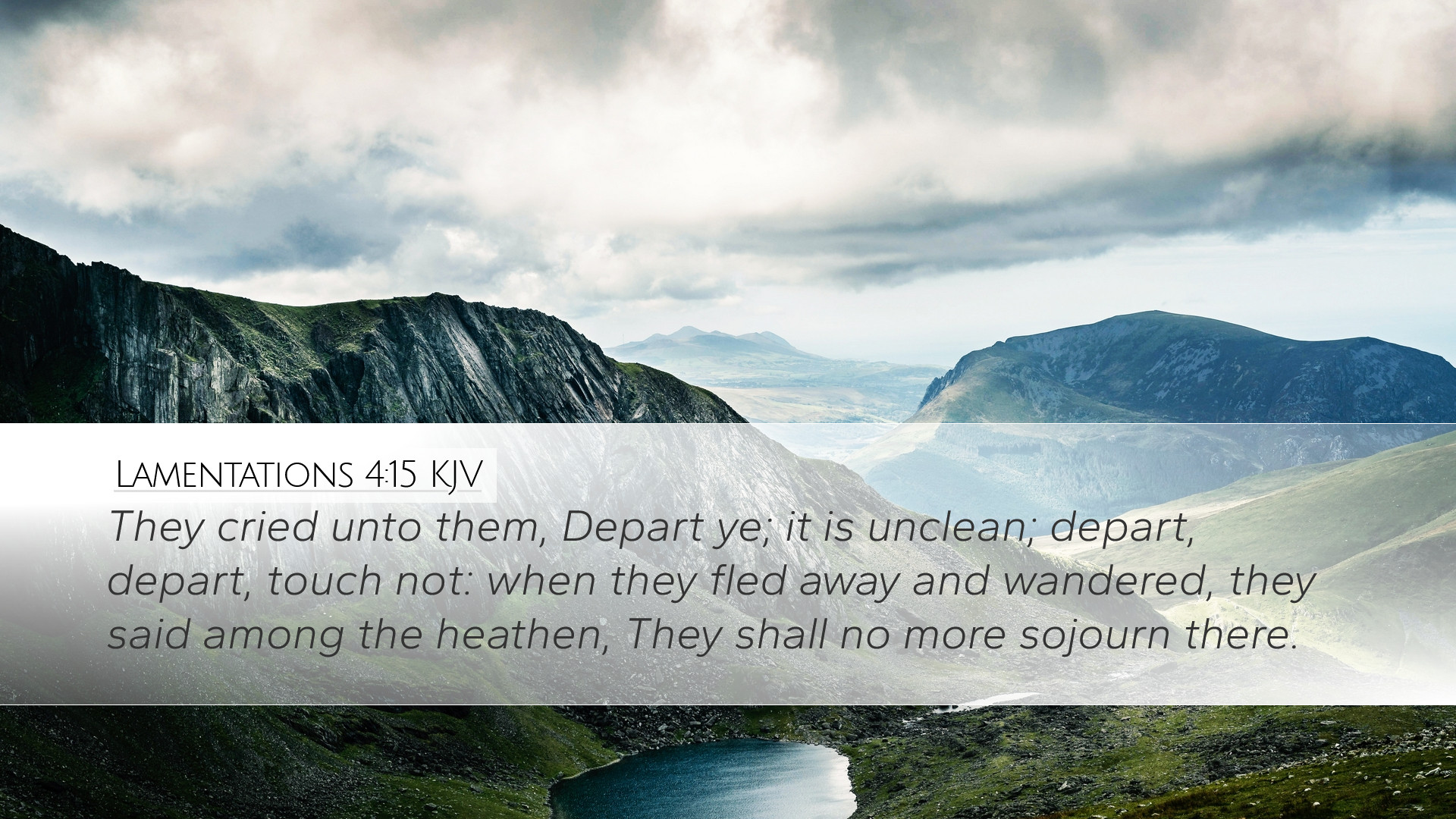Lamentations 4:15 Commentary
Verse Context: Lamentations, traditionally attributed to the prophet Jeremiah, reflects the sorrowful lament for the destruction of Jerusalem and the suffering of its people. Chapter 4 focuses on the harsh realities faced by the inhabitants of the city after the Babylonian siege. Verse 15 serves as a poignant observation of the chaos and moral disintegration experienced during this period.
Text of Lamentations 4:15
"They cried to them, Depart ye; it is unclean; depart, depart, touch not; when they fled away and wandered, they said among the heathen, They shall no more sojourn there."
Commentary Overview
This verse captures the desperate voices of the people in the midst of calamity. The cry for separation and purity reflects an underlying theme of defilement that pervades the city, emphasizing the drastic and tragic outcomes of sin and rebellion against God.
Insights from Matthew Henry
Matthew Henry highlights the social and spiritual decay that has overtaken Jerusalem. He points out that the people, once esteemed, have become so defiled that they are considered unclean. In a moral sense, the cry of “Depart!” illustrates a profound loss of community and the breakdown of social bonds. Henry explains that such separation was indicative not only of physical conditions but also of spiritual degradation.
Insights from Albert Barnes
Albert Barnes delves into the implications of the term “unclean.” He emphasizes that the purity laws outlined in the Mosaic law now serve as a bitter reminder of the state of the city. The people became a parable of sin, prompting their neighbors to reject them. Barnes argues that this verse underscores a deep theological message about the consequences of sin, reflecting the broader theme of exile and longing for spiritual purity.
Insights from Adam Clarke
Adam Clarke provides a historical perspective and contextual analysis of this lament. He indicates that the feeling of being driven away resonates with the exiled community’s longing for Jerusalem. Clarke notes that the lamentations signify not only physical displacement but also a profound spiritual disconnection from God. His commentary emphasizes the inherent hope intertwined within sorrow; while they were cast out among the heathen, a remnant remained who would continue to seek divine restoration.
Theological Implications
This verse brings forth important theological implications regarding purity, community, and the consequences of sin. Below are several key themes:
- Separation from God: The appeal to depart signifies a reality where sin results in a severed relationship between humanity and God.
- Community and Identity: The societal collapse reflects how communal identity is intertwined with spiritual fidelity. The rejection by the nations illustrates the broader abandonment resulting from iniquity.
- Hope amid Despair: Despite the sorrow, the longing for restoration exists, indicating that in the midst of judgment, God's mercy is still attainable.
Practical Application
For pastors, students, and theologians today, Lamentations 4:15 challenges believers to reflect on the consequences of sin—not just on an individual level, but corporately within the church and society. It encourages a return to holiness and an understanding of communal responsibility:
- Examine Personal and Corporate Holiness: Leaders should guide congregations toward understanding the impact of sin and the call to live in holiness.
- Cultivating Community: Emphasize the importance of community and mutual responsibility in maintaining spiritual health.
- Hope in Desolation: Incorporate the themes of hope and restoration in preaching, reminding congregations that God's grace is available even in our darkest moments.
Conclusion
Lamentations 4:15 is a powerful reminder of the consequences of sin and the longing for purity and restoration. The insights from respected commentaries reveal a depth of understanding that is not only historical but also profoundly applicable to the spiritual landscape of today. As we reflect on this verse, may it serve as a call to continual vigilance in our spiritual walk and community life.


